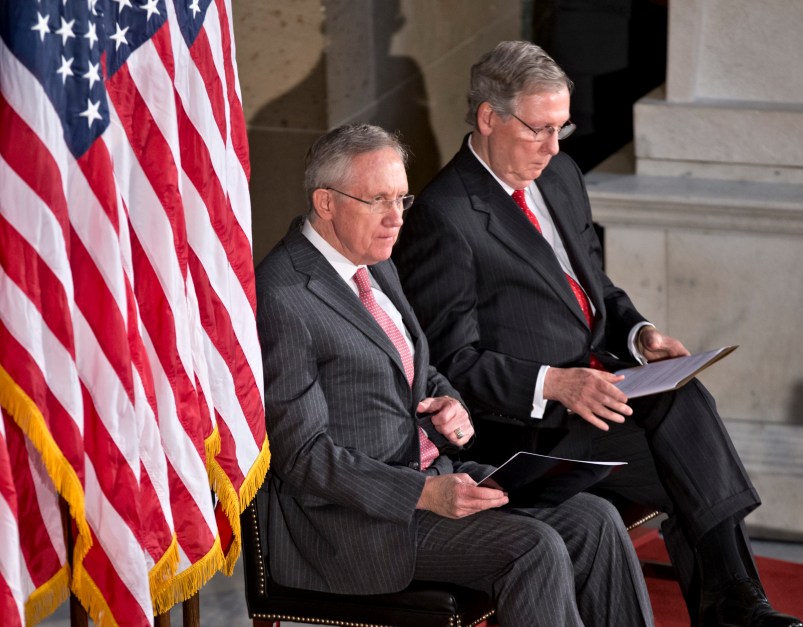Senate leaders hit the brakes Tuesday afternoon on an emerging agreement to avert a catastrophic debt default in anticipation of action from a chaotic House Republican majority.
“We are coming bracingly close to the edge. I think we’re looking over it now,” said Sen. Chris Coons (D-DE). “We’re in very dangerous territory.”
There’s an arcane procedural reason the Senate is waiting. If it were to advance its own bill through the normal channels, stalling tactics expected to be used by arch-conservatives like Sen. Ted Cruz (R-TX) could delay passage until the weekend. But if the House were to pass a debt limit hike first, the Senate could declare the measure “privileged” and advance it quickly, possibly by amending it and sending it back.
“We’re sitting tight and prepping both options and will see what happens over there this afternoon,” said a senior Democratic Senate aide.
If the House acts first, “it saves us about five days,” said Don Stewart, a spokesman for Senate Minority Leader Mitch McConnell (R-KY).
The framework of the Senate deal, negotiated by Majority Leader Harry Reid (D-NV) and McConnell, is nearly complete and awaiting a handshake. It would lift and debt ceiling through Feb. 7 and re-open and fund the federal government through Jan. 15, along with making some relatively noncontroversial changes to Obamacare.
Where the path forward is less clear is in the House. At a meeting Tuesday morning, House Republicans fell into disarray after conservatives quickly tanked their new debt limit plan to add some additional items in the Senate proposal, which the White House and Democrats quickly rejected. GOP leaders scrambled and looked for a way to revive it. In the meantime, the Senate hit pause to give the House room to pass a bill before moving theirs.
For now, senators from both sides sound fatalistic as the clock ticks to a Thursday deadline to exhaust the nation’s borrowing capacity and risk default on its debt.
“I had hoped that the two leaders would have an agreement by now,” said Sen. Susan Collins (R-ME). “I thought yesterday that they were extremely close. But it appears that they don’t have an agreement. And in the meantime, Speaker Boehner has put forth a plan but I understand he’s drawn that back.”
“I’m stunned,” said Coons. “I think this is reckless. And if [Boehner] in the end chooses to put his speakership ahead of our nation’s finances and our place in the world, I think that’s just strikingly irresponsible. I really thought we were coming in today to be told in caucus that there’s a deal, it’s resolved, we’re going to vote this afternoon and send it to the House.”
Sen. Lindsey Graham (R-SC) said he was “proud” of Boehner’s handling of the crisis. Then within moments he pleaded with Democrats to bail out the GOP, which he admitted has “screwed up” and “really did go too far” in the shutdown and debt limit standoffs.
“We won’t be the last political party to overplay our hand,” he said. “It might happen one day on the Democratic side. And if it did, would Republicans, for the good of the country, kinda give a little? We really did go too far. We screwed up. But their response is making things worse, not better.”
House GOP leaders held private meetings on Tuesday afternoon to look for a path forward that holds together their conference. They may not delay or repeal the medical device tax — something that both Democrats and Republicans have backed — and considered rescinding health insurance subsidies to congressional staffers (known as the Vitter amendment) and overturning Obamacare’s contraception coverage mandate.
“I don’t know how this is going to play out today and tomorrow,” said Coons. “And given how long it takes to get things done here … well, you do the math.”
TPM asked Graham if he’d prefer default to a clean debt limit hike.
“I think both are terrible options and it’d be silly to pick between the two,” he said. “Only a dysfunctional democracy would have those two choices — which means it may happen.”






